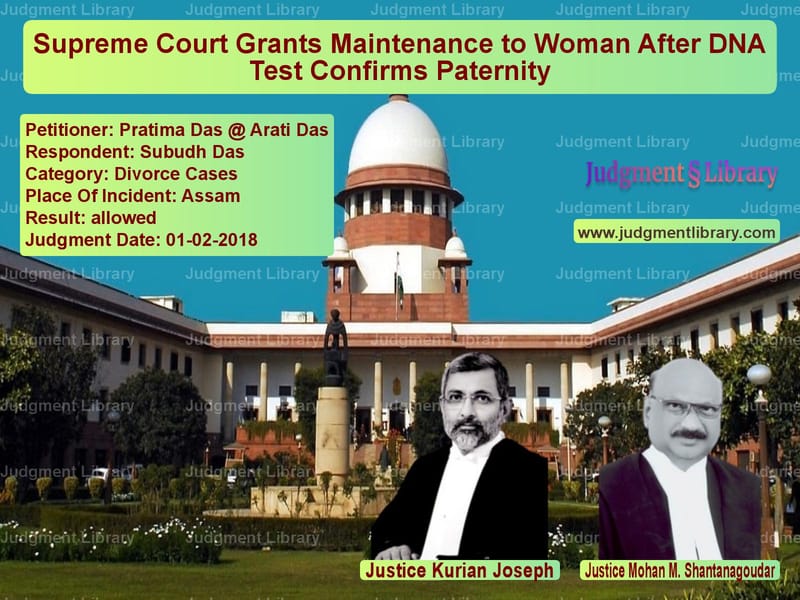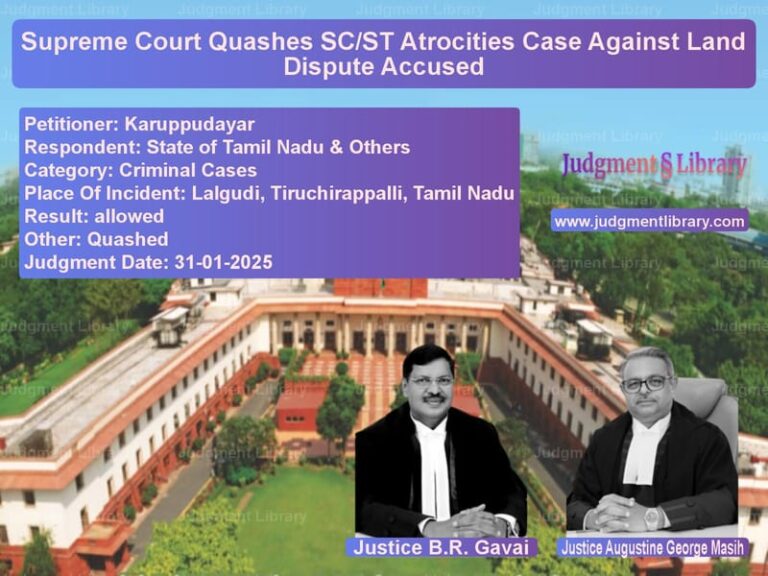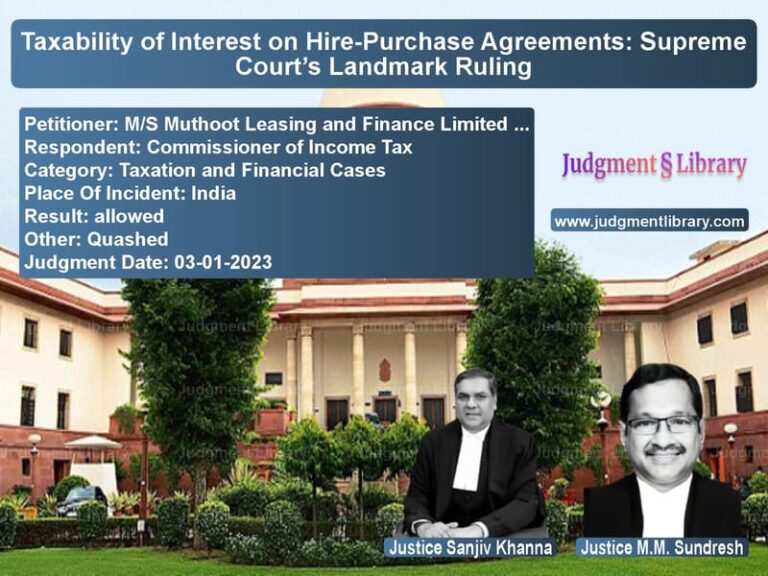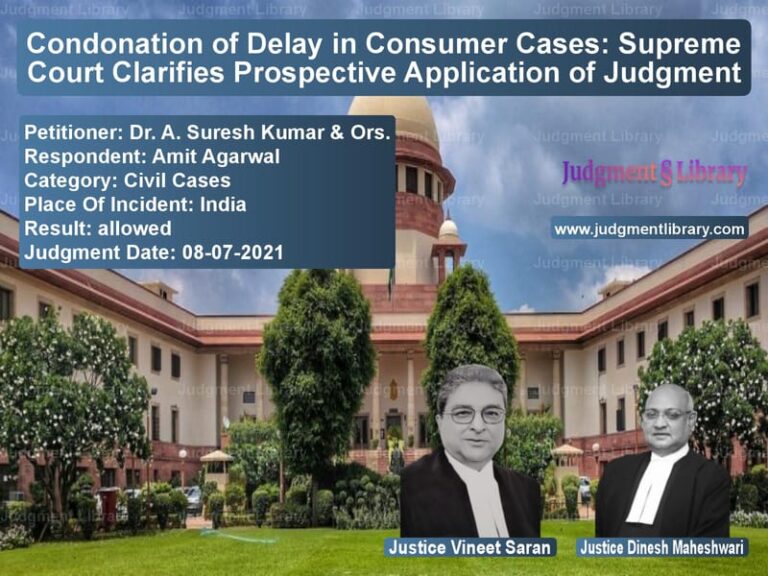Supreme Court Grants Maintenance to Woman After DNA Test Confirms Paternity
Petitioner Name: Pratima Das @ Arati DasRespondent Name: Subudh DasJudgment By: Justice Kurian Joseph, Justice Mohan M. ShantanagoudarJudgment Date: 01-02-2018
The Supreme Court of India recently ruled in Pratima Das @ Arati Das vs. Subudh Das, addressing the issue of maintenance under Section 125 of the Criminal Procedure Code (CrPC). The case revolved around the legitimacy of the appellant’s claim that she was the wife of the respondent and that he had fathered three children with her. The Supreme Court, relying on a DNA test, reinstated the maintenance order in favor of the appellant, setting aside the Gauhati High Court’s ruling that had denied her maintenance.
Background of the Case
The appellant, Pratima Das, had approached the Sub-Divisional Judicial Magistrate (SDJM), Hojai, Sankardev Nagar, under Section 125 CrPC, seeking maintenance from the respondent, Subudh Das. She claimed that she was his wife and that he had fathered three children with her. The SDJM ruled in her favor and directed the respondent to pay Rs. 4,000 per month as maintenance, effective from September 2013.
However, the respondent challenged this order before the Gauhati High Court, arguing that the appellant had failed to prove that she was his legally wedded wife. The High Court, agreeing with the respondent, set aside the SDJM’s order, denying maintenance to the appellant.
Petitioner’s (Appellant’s) Arguments
Pratima Das, the appellant, raised the following arguments before the Supreme Court:
- She had lived with the respondent as his wife and had borne him three children.
- Despite cohabiting with her and fathering three children, the respondent had abandoned her without providing financial support.
- Under Section 125 CrPC, even if a marriage is disputed, the respondent had an obligation to maintain her if he had treated her as his wife.
- The High Court erred in denying maintenance solely on the ground that she had not established her marriage.
Respondent’s Arguments
Subudh Das, the respondent, presented the following counterarguments:
- He denied that he had ever been married to the appellant.
- He contended that the children were not his and that he had no legal obligation to provide maintenance.
- The appellant had failed to produce conclusive evidence proving their marital relationship.
- The High Court had correctly ruled that, in the absence of proof of marriage, no maintenance could be granted under Section 125 CrPC.
Supreme Court’s Judgment
Direction for DNA Test
Recognizing the dispute over paternity, the Supreme Court, in its order dated February 28, 2017, directed that a DNA test be conducted to ascertain whether the respondent was the father of the appellant’s children. The Court stated:
“In a case where the paternity of children is disputed, a DNA test is the most scientific and conclusive method to establish the truth. The respondent shall cooperate in the test to ensure that justice is served.”
DNA Test Results Confirm Paternity
The DNA test results, subsequently submitted to the Court, confirmed that the respondent was indeed the father of the three children born to the appellant. Based on this evidence, the Supreme Court ruled:
“The DNA test report establishes beyond doubt that the respondent is the biological father of the three children. This evidence negates the respondent’s contention that he had no relationship with the appellant.”
Restoration of Maintenance Order
With the paternity issue resolved, the Supreme Court set aside the Gauhati High Court’s ruling and reinstated the SDJM’s order directing the respondent to pay Rs. 4,000 per month as maintenance. The Court ruled:
“We set aside the impugned order passed by the High Court and restore the order dated 04.09.2013 passed by the Sub-Divisional Judicial Magistrate, Hojai, Sankardev Nagar, in M.R. Case No. 99 of 2008 filed under Section 125 Cr.P.C.”
Timeframe for Payment
The Court directed the respondent to clear all arrears within four months from the date of judgment. It stated:
“The arrears as on today shall be paid within a period of four months from today.”
Key Takeaways from the Judgment
- DNA Test as Decisive Evidence: The judgment reaffirms the importance of DNA testing in resolving paternity disputes.
- Broad Interpretation of Maintenance Laws: Even if a marriage is disputed, the respondent’s obligation to maintain a woman may still arise if he has lived with her and fathered children.
- Rejection of False Denials: The Court’s ruling sends a strong message that denying responsibility for children without factual basis will not be entertained.
- Reinforcement of Women’s Rights: The decision ensures that women and their children are not left destitute due to legal technicalities.
Conclusion
The Supreme Court’s judgment in Pratima Das @ Arati Das vs. Subudh Das sets a vital precedent in maintenance cases, ensuring that men cannot evade their responsibility simply by denying a marital relationship. The use of DNA evidence played a crucial role in establishing the truth and securing justice for the appellant. The decision strengthens the rights of women and children under Section 125 CrPC and reinforces the principle that maintenance laws exist to prevent destitution and ensure financial security for dependents.
Don’t miss out on the full details! Download the complete judgment in PDF format below and gain valuable insights instantly!
Download Judgment: Pratima Das @ Arati vs Subudh Das Supreme Court of India Judgment Dated 01-02-2018.pdf
Direct Downlaod Judgment: Direct downlaod this Judgment
See all petitions in Alimony and Maintenance
See all petitions in Child Custody
See all petitions in Muslim Personal Law
See all petitions in Judgment by Kurian Joseph
See all petitions in Judgment by Mohan M. Shantanagoudar
See all petitions in allowed
See all petitions in supreme court of India judgments February 2018
See all petitions in 2018 judgments
See all posts in Divorce Cases Category
See all allowed petitions in Divorce Cases Category
See all Dismissed petitions in Divorce Cases Category
See all partially allowed petitions in Divorce Cases Category







